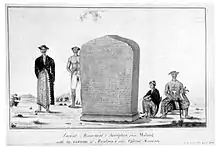Sri Maharaja Rakai Pangkaja Dyah Wawa Sri Wijayalokanamottungga, better known in Indonesia as Dyah Wawa, was a ruler of the Mataram Kingdom in Central Java,[1]: 127–128 Indonesia (r. 924–929).
| Wawa of Mataram | |||||
|---|---|---|---|---|---|
| King of Mataram | |||||
| Reign | 924 – 929 | ||||
| Predecessor | Rakai Layang Dyah Tulodong | ||||
| Successor | Rakai Hino Dyah Siṇḍok | ||||
| Born | Dyah Wawa | ||||
| Issue | Dyah Kbi | ||||
| |||||
| House | Sanjaya | ||||
| Religion | Shivaist Hinduism | ||||

The so-called Minto Stone was 2 metres (6.6 ft) high and weighed 3.8 tons was found in "Ngendat" and described by Colin Mackenzie in 1811–14
What is known of him is mainly thanks to an inscription engraved on the Minto Stone.
Wawa's son-in-law and successor, Mpu Sindok (r. 929–947), moved the court of Mataram from Central Java to East Java in 929. The latter could have buried the former at Belahan Temple near Pasuruan in East Java.
References
- ↑ Coedès, George (1968). Walter F. Vella (ed.). The Indianized States of Southeast Asia. trans.Susan Brown Cowing. University of Hawaii Press. ISBN 978-0-8248-0368-1.
- "Javanese demand repatriation of Minto's stone of contention". The Southern Reporter. 6 February 2008. Retrieved 2011-02-28.
- "Indonesia demands historic stone back". The Scotsman. 4 February 2008. Retrieved 2011-02-28.
- "Ancient relic to return from Scotland". The Jakarta Post. 25 January 2008. Retrieved 2011-02-28.
Further reading
- Coedès, Georges, Les États hindouisés d'Indochine et d'Indonésie
- Damais, Louis-Charles, "Études d'épigraphie indonésienne", Bulletin de l'École française d'Extrême-Orient, 1951, Vol. 45, No. 45-1, pp. 1–63
- Jordaan, Roy E., "Bělahan and the division of Airlangga's realm", in Bijdragen tot de Taal-, Land- en Volkenkunde, 2008, pp. 326–355
This article is issued from Wikipedia. The text is licensed under Creative Commons - Attribution - Sharealike. Additional terms may apply for the media files.